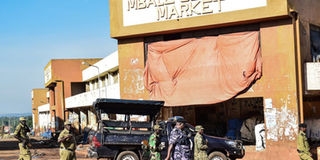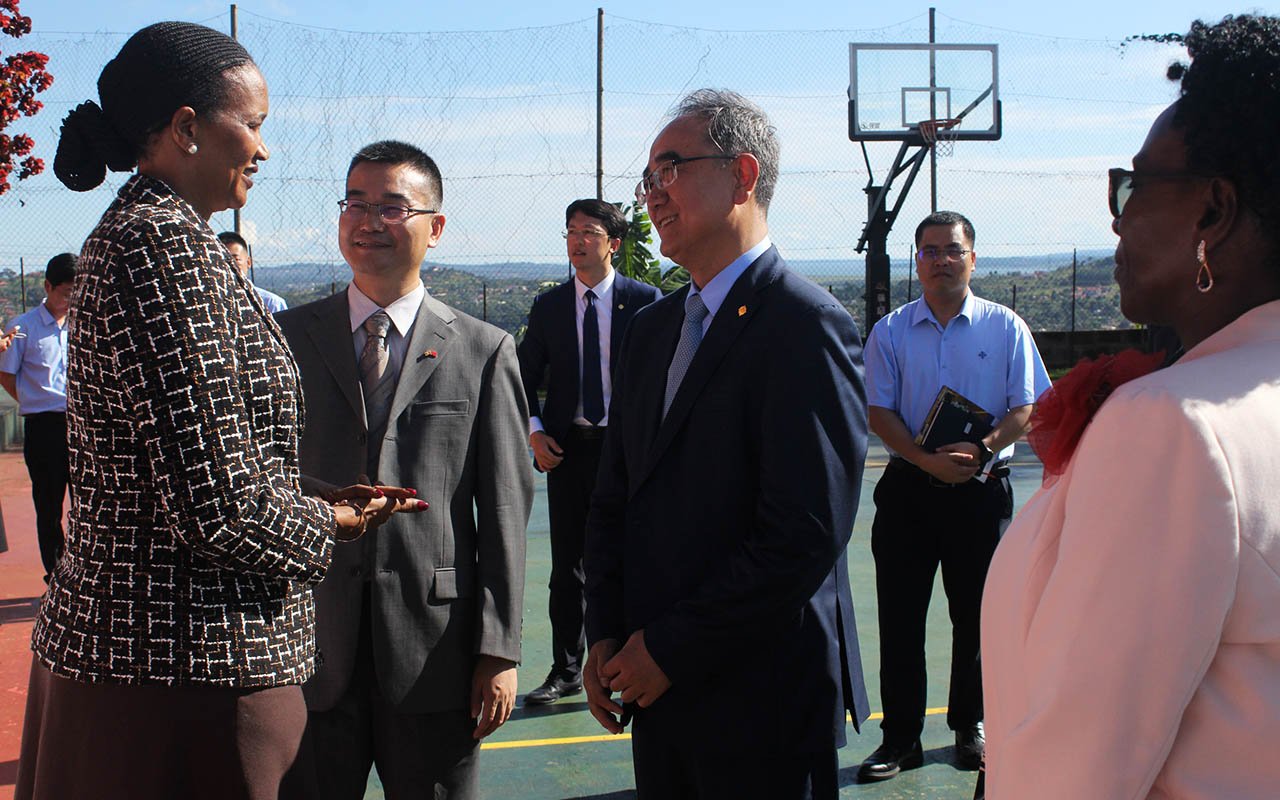Covid-19: Leaders speak out on lockdown woes

No business. Police and army deployed at Mbale Central Market after its closure. The market vendors failed to abide by the directives.
PHOTO BY LOENARD MUKOOLI
What you need to know:
- Operations halted. Local governments can no longer supervise projects, collect revenue, and their budget process is still pending.
- Mr Nathan Ahimbisibwe, the chief administrative officer of Ibanda, said: “We need health workers to handle emergencies during this period but we do not have staff houses. It is a reminder that we have to re-establish staff housing units.”
The measures introduced by the government to prevent spread of coronavirus have brought operations in district local governments nearly to a complete standstill.
With the closure of markets, shops, hotels/lodges and fishing sites, it has become difficult for local government to raise revenue.
Reduction in the number of staff and halting or slowing down of execution of infrastructure projects due to closure of hardware shops and immobility of labour/workers have brought down performance.
“We are affected in the same way the rest in the country are affected; we don’t have markets for cows, the main source of revenue. Revenue collection is not taking place. I can’t say it is low because even hotels and lodges are not working,” Mr Samuel Mugisha Katugunda, the Kiruhura District chairperson, said on Wednesday.
“The few staff that remained will not be able to spend all government money by end of the financial year. Work of constructing and maintaining roads in the district is going on but building schools, water tanks and constructing boreholes stopped because hardware shops closed and workers can’t move,” he added.
Planning hindered
Mr Jeremiah Kamurari, his Isingiro counterpart, shared similar concerns.
“Our 90 per cent of local revenue is from agriculture and all our 60 markets are closed. This will result in poor planning. For example, our next budget will not have indicative planning figures (for local revenue) because we project this from revenue collections of April, May and June yet virtually during this period, we will have no local revenue,” Mr Kamurari said.
Mr Nathan Ahimbisibwe, the chief administrative officer of Ibanda, said: “We need health workers to handle emergencies during this period but we do not have staff houses. It is a reminder that we have to re-establish staff housing units.”
Mr John Okeya, the speaker Tororo district council, said councillors may end up not being paid since council sittings are suspended and the district is not in position to collect revenue.
“They earn by attending council meetings; and now that the sittings have been suspended, I can’t ask the chief administrative officer to authorise payments,” Mr Okeya said.
He added that while key offices have been allowed to operate, the supervisory role is lacking and quality assurance may not be guaranteed because some of the officers need to be closely monitored.
Councillors supervise, among other activities, road works and building construction.
Mr Jimmy Apumeri, the Kwapa Sub-county councillor in Tororo, said like the Parliament, district councils should be given special consideration so that they convene when need arises but on condition that the recommended social distancing is observed.
The deputy speaker of Mbale Municipal Council, Mr Yasin Wabomba said: “The directives have affected our operations. For example, we cannot work without a budget. If we do, then we may not work to the expectation of the communities.”
Mr Edmond Ntimba, the Kabale CAO, said they will still work within confines of the law to conclude the budgetary process without holding a council meeting.
“By the time the lockdown was announced, the district technical planning committee had finished capturing the necessary data for the budget, which we sent to our line ministry for further guidance,” Mr Ntimba said.
He added that the Ministry of Local Government has advised them to present the draft budget to the district council business committee in the presence of the LC5 chairman for subsequent approval.
However, Mr Abel Bizimana, the Kisoro District chairperson, said he is worried that the members of the business and technical committees may not easily be available since public transport was suspended.
Mr Frederick Odongo, Dokolo LC5 chairman, said: “The permanent secretary in the Ministry of Finance has given us a circular dictating that any other payments apart from health, water, police and army should not be effected because it is not essential.”
“This has reduced remittance and worse still, all local revenue has dwindled because businesses have been closed,” he added.
Mr Nelson Adea Akar, the Oyam District chairperson, said their budget conference will be restricted to the executive committee members to ensure social distancing.
Mr Peter Obong Acuda, the Apac District speaker, and Mr Raymond Odongo, secretary Finance in Lira, too cited delay in the budgeting process and loss of local revenue, respectively as consequences of the directives.
“Coronavirus came to add more misery on the already precarious situation we were in under foot and mouth disease quarantine,” Mr Walter Elakas Okiring, the Katakwi chairperson, said. He added that Operation Wealth Creation and other initiatives and projects are frozen following ban of gatherings.
Projects stall
Mr Nginya Hassan, the Koboko chairperson, said: “This is the time that when we would be winding up most activities, however due to this pandemic most of the officers who were implementing and doing supervision of projects are now home. We are worried that funds may be returned to the national treasury.”
Mr Geoffrey Vuciri, the Moyo deputy CAO, said priority is given to emergencies related to health and security. Mr Richard Sajjabi, the Bundibugyo CAO, said the directives had not greatly affected the budgeting process but revenue collection.
“We laid the budget before council. What is left is the discussions which will be handled by the DEC (District Executive Committee),” he said.
The CAO Bunyangabu, Mr Peter Ruhweza, said they still have to end of May to work on the budget. “But that all will depend on how long the lockdown will take,” he added.
Mr Geoffrey Wandera, the Busia District chairperson, said they were supposed to have laid the budget by March 30 but cannot due to ban on large gatherings. Mr Francis Opolot, the Buyenda CAO, said: “We are hard hit by the closure of cattle markets and ban on fishing; but life comes first. We have now resorted to food production to ensure food security.”
Performance worries
In Luweero, Nakasongola and Nakaseke districts, leaders expressed concern over their performance in the next financial year.
Mr Ronald Ndawula, the Luweero District chairperson, claims the district is already overstretched by the pandemic since funds have been redirected to Covid-19 emergencies.
“If the pandemic is not contained in time, we will face a difficult time ahead. Our local revenue performances have greatly been affected. You cannot mobilise for taxes when you have the Covid-19 pandemic. We are now focused on how to save lives of our people,” Mr Ndawula said.
His Nakasongola counterpart, Mr Sam Kigula, said the district is among those that have performed poorly in local revenue mobilisation because of the foot and mouth disease quarantine.
Reported by Alfred Tumushabe, Rajab Mukombozi, Robert Muhereza, Fred Wambede, Joseph Omollo, Bill Oketch, Isaac Otwii, Charity Akullo, Santo Ojok, Simon Peter Emwamu, Felix Warom, Scovin Iceta, Rashul Adidi, Felix Basiime, Philip Wafula, Sam Opio Caleb, Dan Wandera & David Awori




